Four South Korean tourists and their guide were killed by a bomb while watching the sunset at a historic desert city in Yemen, officials said yesterday, as Seoul sent a team to probe the attack.
The bomb on Sunday evening killed two men and two women who were among a group of South Korean tourists visiting Shibam in southeastern Hadramawt Province, a Yemeni interior ministry spokesman said.
The group’s Yemeni guide, wounded in the attack, died later in hospital, the spokesman said, as cited by the official Saba news agency.
Five other South Koreans — three women and two men — and a Yemeni were wounded, he said.
Yemeni officials had earlier given the toll as four South Korean tourists killed and four wounded.
On Sunday, a Yemeni security official, speaking on condition of anonymity, said the blast was caused by a bomb.
“The explosion happened as they were gathered on a hill called Khazzan that overlooks the city. They were on foot and taking pictures of the buildings in Shibam at the moment the sun went down,” he said.
In Seoul, a foreign ministry statement confirmed the death of two South Korean men and two women in an explosion.
The 11 other members of the tour group were flown to the capital Sanaa on a special plane provided by Yemeni authorities.
The wounded are in hospital but not in critical condition, a ministry official told Yonhap news agency.
The Seoul government called an emergency meeting of security and other agencies and yesterday ordered a four-person team to the country, made up of two foreign ministry officials as well as representatives of the national police and the intelligence agency.
“The government expresses deep condolence to the victims and the bereaved families,” ministry spokesman Moon Tae-young said in a statement.
The ministry designated the entire country as a “travel restriction” area and strongly advised its citizens to avoid it.
“When most tourists had got off the jeep and were enjoying the sunset and the surroundings, there was suddenly a bomb explosion. In a second, a hellish situation followed,” travel agent Ma Kyong-chan, who organized the trip, told Yonhap.
Shibam, some 800km southeast of Sanaa, is a UNESCO world heritage site well known for its high-rise mud-brick buildings.
In January last year two Belgian tourists were shot dead along with their local guide and driver in Hadramawt.
Two months later the US embassy was the target of mortar fire that missed and hit a school, killing two people.
A car bomb attack in Marib, also east of Sanaa, in July 2007 killed eight Spanish holidaymakers and two Yemeni drivers.
That attack took place at the entrance to Mahram Bilqis, an ancient temple that legend says belonged to the Queen of Sheba.
In January the local al-Qaeda branch announced in a video message posted on the Internet the merging of the Saudi and Yemeni branches into “Al-Qaeda in the Arabian Peninsula,” led by a Yemeni called Nasser al-Wahaishi.

A French-Algerian man went on trial in France on Monday for burning to death his wife in 2021, a case that shocked the public and sparked heavy criticism of police for failing to take adequate measures to protect her. Mounir Boutaa, now 48, stalked his Algerian-born wife Chahinez Daoud following their separation, and even bought a van he parked outside her house near Bordeaux in southwestern France, which he used to watch her without being detected. On May 4, 2021, he attacked her in the street, shot her in both legs, poured gasoline on her and set her on fire. A neighbor hearing

DEATH CONSTANTLY LOOMING: Decades of detention took a major toll on Iwao Hakamada’s mental health, his lawyers describing him as ‘living in a world of fantasy’ A Japanese man wrongly convicted of murder who was the world’s longest-serving death row inmate has been awarded US$1.44 million in compensation, an official said yesterday. The payout represents ¥12,500 (US$83) for each day of the more than four decades that Iwao Hakamada spent in detention, most of it on death row when each day could have been his last. It is a record for compensation of this kind, Japanese media said. The former boxer, now 89, was exonerated last year of a 1966 quadruple murder after a tireless campaign by his sister and others. The case sparked scrutiny of the justice system in

DITCH TACTICS: Kenyan officers were on their way to rescue Haitian police stuck in a ditch suspected to have been deliberately dug by Haitian gang members A Kenyan policeman deployed in Haiti has gone missing after violent gangs attacked a group of officers on a rescue mission, a UN-backed multinational security mission said in a statement yesterday. The Kenyan officers on Tuesday were on their way to rescue Haitian police stuck in a ditch “suspected to have been deliberately dug by gangs,” the statement said, adding that “specialized teams have been deployed” to search for the missing officer. Local media outlets in Haiti reported that the officer had been killed and videos of a lifeless man clothed in Kenyan uniform were shared on social media. Gang violence has left

‘HUMAN NEGLIGENCE’: The fire is believed to have been caused by someone who was visiting an ancestral grave and accidentally started the blaze, the acting president said Deadly wildfires in South Korea worsened overnight, officials said yesterday, as dry, windy weather hampered efforts to contain one of the nation’s worst-ever fire outbreaks. More than a dozen different blazes broke out over the weekend, with Acting South Korean Interior and Safety Minister Ko Ki-dong reporting thousands of hectares burned and four people killed. “The wildfires have so far affected about 14,694 hectares, with damage continuing to grow,” Ko said. The extent of damage would make the fires collectively the third-largest in South Korea’s history. The largest was an April 2000 blaze that scorched 23,913 hectares across the east coast. More than 3,000